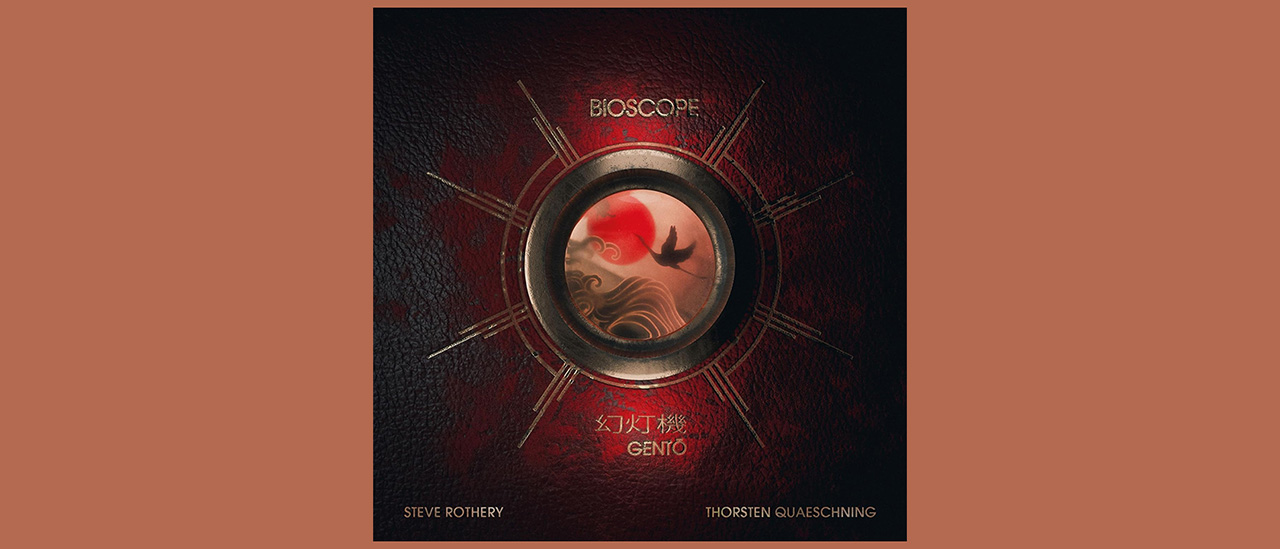You can trust Louder
A pillar of the neo-prog world hangs out with the heir apparent of the Berlin School of electronica in this first collaboration between latterday Tangerine Dream man Thorsten Quaeschning and Marillion’s Steve Rothery.
The album’s unifying theme is the moving image – a fitting subject in light of all the film soundtracks in the Tangerine Dream discography and Rothery’s enthusiasm for photography. The concept informs the song titles and the name of the project itself.
Derived from the Greek words meaning ‘life’ and ‘to look,’ the pair called their collaboration Bioscope after an early film projector, while Gentō takes its name from a 17th-century Japanese magic lantern.
So far, so cinematic. But if Gentō were a movie it would be less Hollywood blockbuster, more arthouse flick: three of its five instrumental tracks – Vanishing Point, Kinetoscope and the title track – are filmic, three-part suites.
Sonically, Quaeschning’s analogue electronics typically take the lead, with Rothery’s guitar providing splashes of colour and emotion atop the percolating synthesisers. Generally, Bioscope’s sound feels based primarily on the Berlin School aesthetic, resulting in a record that’s much closer to Tangerine Dream than anything in the Marillion catalogue.
A fairer reference point from Rothery’s back catalogue would be his 2014 album The Ghosts Of Pripyat, in terms of tone and atmosphere, if not production and instrumentation. His style is so distinctive that he still sounds like himself even when framed in a very different context to his day job.
The duo are complemented by Elbow drummer Alex Reeves, who applies a tasteful, refined approach, skilfully building intensity in the arrangements, happy to sit back and leave space as the moment requires.
Sign up below to get the latest from Prog, plus exclusive special offers, direct to your inbox!
One of Bioscope’s defining musical features is that Quaeschning and Rothery always take the scenic route, never rushing to the destination. Vanishing Point builds over gently persistent electronic sequences, while Rothery’s guitar is drenched in reverb and echo; his long, mournful lines singing and weeping over the ambient backgrounds, evoking glimpses of his day job.
Gentō itself feels like the slightest song – very much a piece of ambient mood music, with a defined melody or structure never quite emerging from the formless effervescent electronics. Ultimately it drifts back to the ether from which it emerged, rather than offering a resolution.
Kinetoscope inhabits a similar space, slowly coalescing out of Quaeschning’s electronic primordial ooze. The song develops slowly, taking on a darker tone in its final section; and the changes are subtle and understated, given the album’s unifying theme about the moving image. It becomes a soundtrack in search of a movie.
It’s not hard to see why it was chosen as the lead single. It’s the shortest piece here; in tone and mood it feels very different in sound and atmosphere to the other four tracks that make up Gentō. Where the others are introspective and astral, Kaleidoscope is a burst of bright colours and sunshine.
Rothery takes the reins with a happy, jangly riff that veers close to psych-tinged power pop. Its clearly articulated structure and catchy melody represent a very different side to the duo’s creative partnership compared to the rest of the material on here.
Bioscope itself sits somewhere between Kaleidoscope and the rest. There’s a sense of momentum, with Rees’ steady percussive heartbeat complemented by some melodic interjections on his toms, and there’s a pleasing interplay between the electronics and guitar. Rothery uses sustain beautifully and employs contrasting textures to clever effect, offsetting a grittier tone for lead lines against his shimmery chord voicings.
With the exception of Kaleidoscope, this isn’t an album marked by its immediacy. It’s a record that expects and requires the listener to be free from distractions, to hand themselves over as Quaeschning and Rothery venture across their undulating soundscapes.
The swells and tonal shifts happen incrementally – not in dramatic peaks and valleys – and Gentō will prove most rewarding for those willing to immerse themselves in the experience rather than anyone who prefers music that refuses to be ignored.
Tangerine Dream acolytes will feel at home, but anyone expecting a more conventional prog rock record should approach this with an open mind.
Gentō is on sale now via earMusic.
After starting his writing career covering the unforgiving world of MMA, David moved into music journalism at Rhythm magazine, interviewing legends of the drum kit including Ginger Baker and Neil Peart. A regular contributor to Prog, he’s written for Metal Hammer, The Blues, Country Music Magazine and more. The author of Chasing Dragons: An Introduction To The Martial Arts Film, David shares his thoughts on kung fu movies in essays and videos for 88 Films, Arrow Films, and Eureka Entertainment. He firmly believes Steely Dan’s Reelin’ In The Years is the tuniest tune ever tuned.
You must confirm your public display name before commenting
Please logout and then login again, you will then be prompted to enter your display name.





